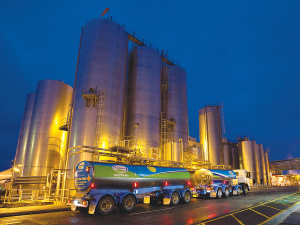The co-operative announced a new 2021/22 forecast farmgate milk price range of $9.10 to $9.50/kgMS, down from $9.30 - $9.90/kgMS.
This reduces the midpoint of the range, which farmers are paid off, from $9.60/kgMS to $9.30/kgMS.
Despite the 30c drop, Fonterra farmers remain in line for a record payout.
Fonterra chief executive Miles Hurrell says the news will be disappointing for farmers.
But Hurrell notes that the change in global dairy prices is coming off record high levels.
“At a midpoint of $9.30/kgMS, this would continue to be the highest forecast farmgate milk price in the co-op’s history and would see us contribute almost $14 billion into New Zealand’s economy through milk price payments, which supports the wellbeing of our local communities,” he says.
Hurrell says the change in the forecast milk price is due to a number of recent events which have resulted in short-term impacts on global demand for dairy products - in particular, the lockdowns in China due to COVID-19, the economic crisis in Sri Lanka and the Russia-Ukraine conflict.
“While the long-term outlook for dairy remains positive, and we expect global demand and supply to be more balanced over the rest of the year, we have seen these short-term impacts flow through into pricing on the Global Dairy Trade (GDT) platform.
“For example, average prices for whole milk powder (WMP), a key driver of the milk price, have decreased by 18% over the past four GDT events.
“As an exporter to 140 countries we deal with these kinds of global events all the time, but right now we’re seeing the impact of multiple events. Coupled with inflationary pressures, it’s not surprising to see buyers being cautious.
“Our scale and ability to move products between different markets and categories remains important, and reinforces our strategic focus on ensuring our milk is going into the highest value products.”
Hurrell believes global milk production is expected to remain constrained as high feed, fertiliser and energy costs continue to impact production in the Northern Hemisphere.
“We expect demand to recover as the short-term impacts begin to resolve.
“While there is still a high level of uncertainty in global markets, the majority of our milk has been contracted for the season. It’s for this reason that we’ve made the decision to narrow our forecast range to +/- 20 cents.
“As always, there are a number of risks we are continuing to keep a close eye on, including potential impacts on demand from inflationary pressures and rising interest rates, increased volatility as a result of high dairy prices, and further disruptions from COVID-19 and geopolitical events.”



















